Latest
Latest News
Latest News
Latest News
In The Trenches
Some Good News from Kansas
Some good news, from our friends at the Drug Policy Forum of Kansas:
March 19, 2007
The Kansas House Judiciary Committee today killed SB 14, the drug offender registry bill.
This legislation would have required persons convicted of sale of illegal drugs with 1000 yards of a school, or of manufacturing methamphetamine, to register on the KBI offender web site every 6 months for the rest of their life.
The bill passed the KS Senate 39-0 in January.
Testifying in opposition to SB 14 was DPFKS executive director Laura Green, along with KS Families Against Mandatory Minimums director Peter Ninemire, Jennifer Roth of the Kansas Association of Criminal Defense Lawyers and the parents of a currently incarcerated meth offender.
Read the testimony on our website.
Testifying for the bill was KBI lobbyist Kyle Smith.
Kudos to the 19 committee member for recognizing this bill as another waste of taxpayer money in the failed war on drugs!
In February, DPFKS contacted the 105 sheriff departments in KS to alert them to the cost to their department to administer this law.
In his testimony to the committee on March 14, KBI lobbyist Smith revealed that the sheriffs were 'grumbling' about the cost to implement the bill. He suggested the committee remove the drug sales offenders and leave the bill with only persons convicted of manufacture of a controlled substance as the registrants.
This was a bill in search of a problem. There is no evidence that someone who goes to prison for manufacturing meth will start another lab and be a danger to society. There has never been one case in Kansas where this has occurred. Unfortunately, this bill is part of a national get-tough-on-crime agenda. Tennessee, Minnesota, and Illinois have passed similar bills. Montana, Georgia, Maine, Oklahoma, Oregon, Washington State and West Virginia are considering similar legislation.
Blog
Hurwitz Prosecutor Caught Up in US Attorneys Controversy
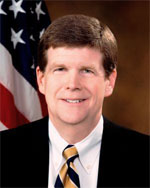 |
|
Republican sources also disclosed that it is now a virtual certainty that Deputy Attorney General Paul J. McNulty, whose incomplete and inaccurate congressional testimony about the prosecutors helped precipitate the crisis, will also resign shortly. Officials were debating whether Gonzales and McNulty should depart at the same time or whether McNulty should go a day or two after Gonzales.Let's hope the reporting about McNulty at least is on target. Whatever the cause for his career's abrupt ending, it will be a good thing. McNulty's actions in the Hurwitz case caused incalculable damage to the cause of pain management with opioids for patients who need it -- effectively he caused large numbers of pain patients to be tortured through denial of medication or under-use of it. Having met Dr. Hurwitz a number of times, and counting a number of his former patients friends, I could be biased about that -- though his conviction has since been overturned due to the trial flaws that prosecutors and the judge created. But I think McNulty's instigation of the withdrawal of the FAQ demonstrates objectively that he is willing to attack the rule of law itself if it suits his purposes. No tears shed for this guy's career, none deserved -- good riddance to at least one really, really cruel, unethical and dishonest prosecutor.
Blog
"Bong Hits 4 Jesus" Oral Arguments Transcript Now Online
http://www.supremecourtus.gov/oral_arguments/argument_transcripts/06-278.pdf
Let us know what comments you find the most interesting...
Drug War Rant has a great backgrounder web section about the case here.
Blog
Pictures from the "Bong Hits 4 Jesus" Free Speech Supreme Court Demonstration and Press Conference
UPDATE: Drug War Chronicle feature report now available here online.
DRCNet associate director David Guard attended the "Bong Hits 4 Jesus" free speech demonstration outside the Supreme Court today, and took pictures for the benefit of those of us who couldn't make it there ourselves. Here are some of the highlights:
Students demonstrating at the courthouse:
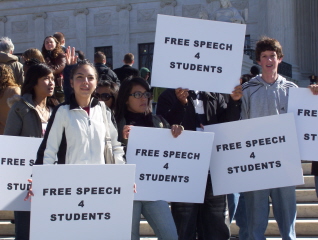
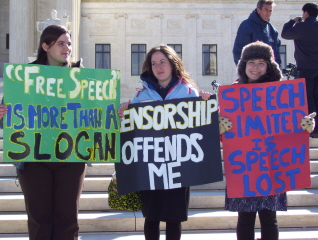 Ken Starr, counsel for the bad guys:
Ken Starr, counsel for the bad guys:
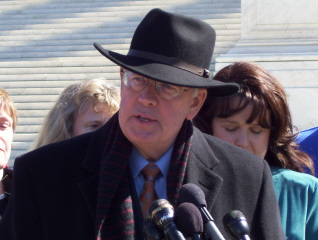 Former US drug czar Barry McCaffrey (also there for the bad guys):
Former US drug czar Barry McCaffrey (also there for the bad guys):
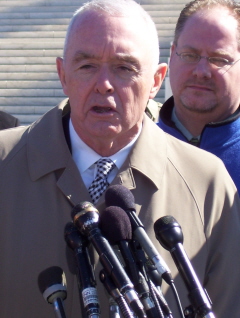 More demonstration and press conference pictures (click the "read full post" or title link in this post to see the rest if you don't already see them):
More demonstration and press conference pictures (click the "read full post" or title link in this post to see the rest if you don't already see them):

 Ken Starr, counsel for the bad guys:
Ken Starr, counsel for the bad guys:
 Former US drug czar Barry McCaffrey (also there for the bad guys):
Former US drug czar Barry McCaffrey (also there for the bad guys):
 More demonstration and press conference pictures (click the "read full post" or title link in this post to see the rest if you don't already see them):
More demonstration and press conference pictures (click the "read full post" or title link in this post to see the rest if you don't already see them):Blog
The Truth About Marijuana Use in the UK
As Phil notes below, there's a new wave of reefer madness taking hold in England. The Independent's reporting is hysterical in both senses of the word, so much so that the ONDCP blog wasted no time in picking up the story.
We're told that marijuana addiction among teenagers has skyrocketed, that marijuana is 25 times stronger than it was generation ago, and that marijuana just might cause schizophrenia. And the underlying implication of all this is that the effort to legalize marijuana, culminating in the UK's 2004 reclassification decriminalizing simple possession, has somehow caused all of these horrible problems.
Interestingly, The Independent's multiple articles yesterday reached their conclusions without mentioning usage rates. Here's why: marijuana use in the UK is going down. From The Observer in October, 2006:
So if it isn't the potency, then what's driving the spike in marijuana treatment in the UK? I think the answer is that reduced stigma and a new policy of not arresting casual users have resulted in more people seeking help. It makes vastly more sense than arguing that marijuana suddenly turned into crack laced with heroin the moment they decriminalized it.
I can't prove my theory anymore than addiction "experts" can prove that marijuana had almost no THC in the '60's. But it makes intuitive sense. Wouldn't you expect more people to seek treatment once the risk of arrest is removed?
After decriminalizing marijuana, the British are seeing lower usage rates and more people seeking treatment. Let's talk about that.
We're told that marijuana addiction among teenagers has skyrocketed, that marijuana is 25 times stronger than it was generation ago, and that marijuana just might cause schizophrenia. And the underlying implication of all this is that the effort to legalize marijuana, culminating in the UK's 2004 reclassification decriminalizing simple possession, has somehow caused all of these horrible problems.
Interestingly, The Independent's multiple articles yesterday reached their conclusions without mentioning usage rates. Here's why: marijuana use in the UK is going down. From The Observer in October, 2006:
According to a report by the Central Narcotics Office, after more than a decade of rapid growth, seizures of cannabis resin in Europe dropped by a fifth last year, to 831 tonnes.The failure to address this relevant, yet contradictory fact is a hallmark of alarmist pseudo-scientific drug war reporting. Instead we get this:
â¦
The apparent trend is reinforced by British figures which show that the popularity of cannabis in the UK has plummeted, with 600,000 fewer people smoking or eating marijuana than three years ago.
Today record numbers of young people are in treatment programmes for skunk [high-grade marijuana] abuse and hospital admissions due to the drug are at their highest ever.We know that rumors of more potent pot are both wildly exaggerated and largely irrelevant since users adjust their doses to achieve the desired effect regardless of potency. We also know that potency has increased notably (3-4 times, not 25) and that increased potency has much to do with prohibition, which creates a financial incentive for growers to maximize their risk/reward ratio since punishment is determined by weight rather than THC content.
So if it isn't the potency, then what's driving the spike in marijuana treatment in the UK? I think the answer is that reduced stigma and a new policy of not arresting casual users have resulted in more people seeking help. It makes vastly more sense than arguing that marijuana suddenly turned into crack laced with heroin the moment they decriminalized it.
I can't prove my theory anymore than addiction "experts" can prove that marijuana had almost no THC in the '60's. But it makes intuitive sense. Wouldn't you expect more people to seek treatment once the risk of arrest is removed?
After decriminalizing marijuana, the British are seeing lower usage rates and more people seeking treatment. Let's talk about that.
Chronicle
Anuncio: Nuevo Formato para el Calendario del Reformador
Visite nuestra página web todos los dÃas para ver un cómputo actuante de los eventos que sucederán prontamente, y más.
Chronicle
Listado de Empleos: Cambio de Jeringas, Harm Reduction Coalition, California
La Harm Reduction Coalition busca una persona para su cargo de Especialista en Programa de Cambio de Jeringas en California.
Chronicle
Listado de Empleos: MPP, Minneapolis y DC
El Marijuana Policy Project tiene dos nuevos cargos disponibles â TecnologÃa de la Información en Washington y Analista de Campañas en Minneapolis.
Chronicle
Anuncio: Los Feeds RSS de DRCNet Están Disponibles
Ahora hay una nueva manera de recibir los artÃculos de la DRCNet â la <em>Crónica de la Guerra Contra las Drogas</em> y más.
Chronicle
Anuncio: ¡Ahora los Feeds de Agregación de Contenido de la DRCNet Están Disponibles para SU Página Web!
¡Apoye la causa poniendo enlaces de contenido de actualización automática de la <em>Crónica de la Guerra Contra las Drogas</em> y de la DRCNet en su página web!
Chronicle
Semanal: Esta Semana en la Historia
Los sucesos y citas de nota de los eventos de las polÃticas de drogas de esta semana de los años anteriores.
Chronicle
Australia: Pedido de Despenalización de la Tenencia de Drogas de los Verdes de Nueva Gales del Sur Causa Alboroto Preelectoral
A 10 dÃas de las elecciones estaduales en Nueva Gales del Sur de Australia, el pedido del Partido Verde para despenalizar la tenencia de drogas está causando un alboroto.
Chronicle
Marihuana: Protesta de Base en Ciudadecita de Wisconsin Después de Redada de Drogas
Cuando la policÃa local en Stevens Point, Wisconsin, arrestó a un bando de chicos con veinte y tantos años por ventas menores de marihuana y pÃldoras, algunos habitantes locales conmemoraron. Pero, en un ejemplo de activismo de base, otros se echaron a la calle para protestar.
Pagination
- First page
- Previous page
- …
- 1193
- 1194
- 1195
- 1196
- 1197
- …
- Next page
- Last page